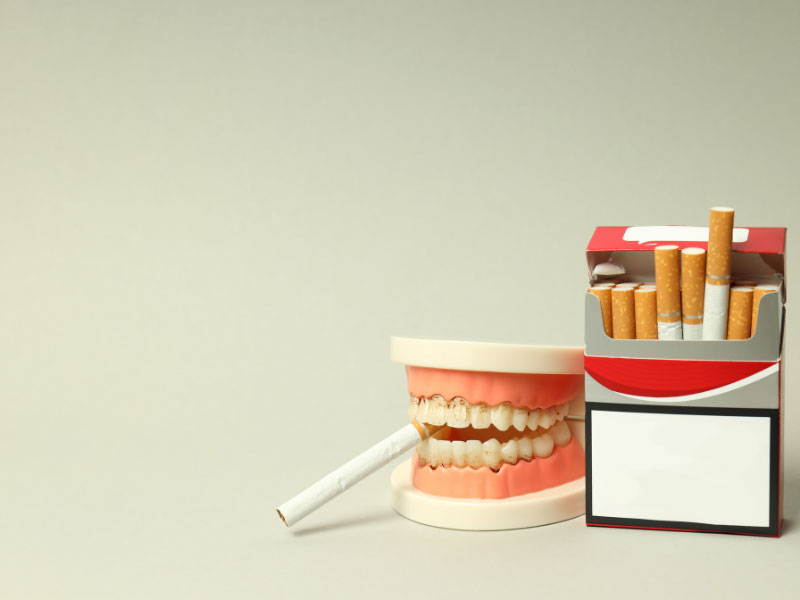Smoking and Your Teeth

At Spokane Dental, we don’t solely care for your teeth. By improving your oral health, we can positively impact whole body health. That is why it is so important to us to inform our patients about the effects of smoking on their oral health. Smoking is not only harmful to your lungs and heart but also has a significant impact on your teeth and gums. In this blog post, we will discuss how smoking affects your teeth and what you can do to prevent further damage.
Smoking and Oral Cancer
Did you know that at every visit, Dr. Smith performs an oral cancer screening? The dental chair is one of the first lines of defense for screening oral cancer, and often where it gets caught the most (and earliest). Smoking is a major risk factor for oral cancer, and a factor that we don’t take lightly in our oral health screenings. According to the American Cancer Society, smokers are six times more likely to develop oral cancer than non-smokers. The chemicals in cigarettes can actually damage the DNA in your oral tissue, which can lead to the formation of cancerous cells.
Smoking and Gum Disease
In addition to oral cancer, smoking is a huge risk factor for gum disease such as gingivitis or periodontitis. Periodontitis is a bacterial infection that causes inflammation that compromises the tissues and bones that support your teeth. When you smoke, the same cancer-causing chemicals in cigarettes can cause inflammation and irritation of the gums, which can lead to disease.
Smoking and Tooth Stain
From a purely aesthetic stance, smoking makes it extremely difficult to have a healthy-looking smile. Smoking causes discoloration (as well as compromises the teeth themselves through periodontal disease). The tar and nicotine in cigarettes can stain your teeth, giving them a yellow or brown appearance. Even if you brush and floss regularly, you may still experience discoloration due to smoking.
Smoking and Dry Mouth
Xerostomia, or dry mouth is another large problem amongst our smoking patients. Dry mouth occurs when you don't produce enough saliva to keep your mouth moist. Smoking can cause dry mouth by reducing saliva production. Dry mouth is directly linked to more susceptibility to tooth decay, bad breath, and gum disease.
Smoking and the Immune System
Finally, smoking can also lead to a weakened immune system. This means that if you have a dental problem such as a cavity or gum disease, your body may not be able to fight off the infection as effectively as a non-smoker's body. Because dental disease is driven by inflammation, which is “run” by the immune system, smoking can greatly affect the body’s ability to protect itself from oral disease. This can lead to more severe dental problems and even tooth loss.
How to Protect Your Smile
What can you do to prevent further damage to your teeth if you smoke? The most effective solution is to quit smoking. Quitting smoking can be difficult, but it is worth it for the sake of your oral and overall health. In addition to quitting smoking, there are several other steps you can take to protect your teeth:
- Brush and floss regularly: Brushing and flossing regularly can help remove plaque and prevent tooth decay and gum disease.
- Use mouthwash: Mouthwash can help kill bacteria and freshen your breath. Look for mouthwash that contains fluoride to help protect your teeth.
- Visit Spokane Dental regularly: Regular dental checkups and cleanings can help detect and treat dental problems early before they become more serious.
- Use teeth whitening products: If you have tooth discoloration due to smoking, you can use teeth whitening products to help brighten your teeth. We can make a customized plan to keep your teeth white after a dental cleaning (which removes stain on the outside of the teeth), including custom whitening trays.
Our team at Spokane Dental is here to support you in the best oral and overall health possible. We are just a call away at (509)822-5614.


Please login to publish a comment.
Comments (0)